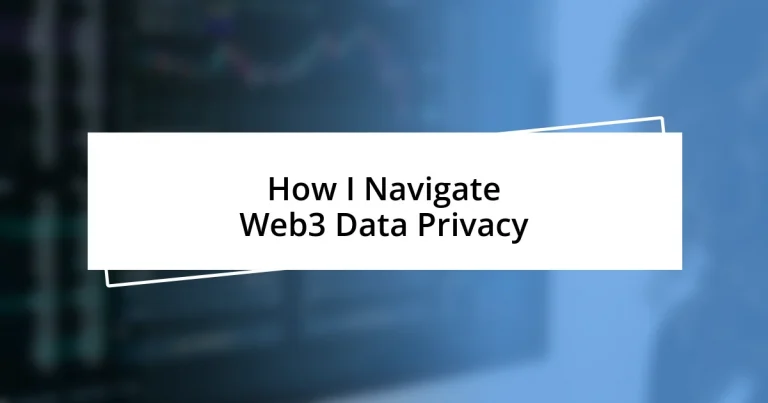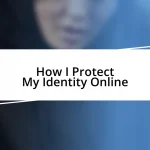Key takeaways:
- Data ownership is crucial in Web3, empowering individuals to control their personal information and profit from it, rather than corporations.
- Employing tools like VPNs, encrypted wallets, and decentralized identity solutions is essential for protecting privacy in the Web3 landscape.
- Future trends in Web3 privacy include the adoption of privacy-preserving technologies, privacy by default practices, and community-driven governance for data policies.
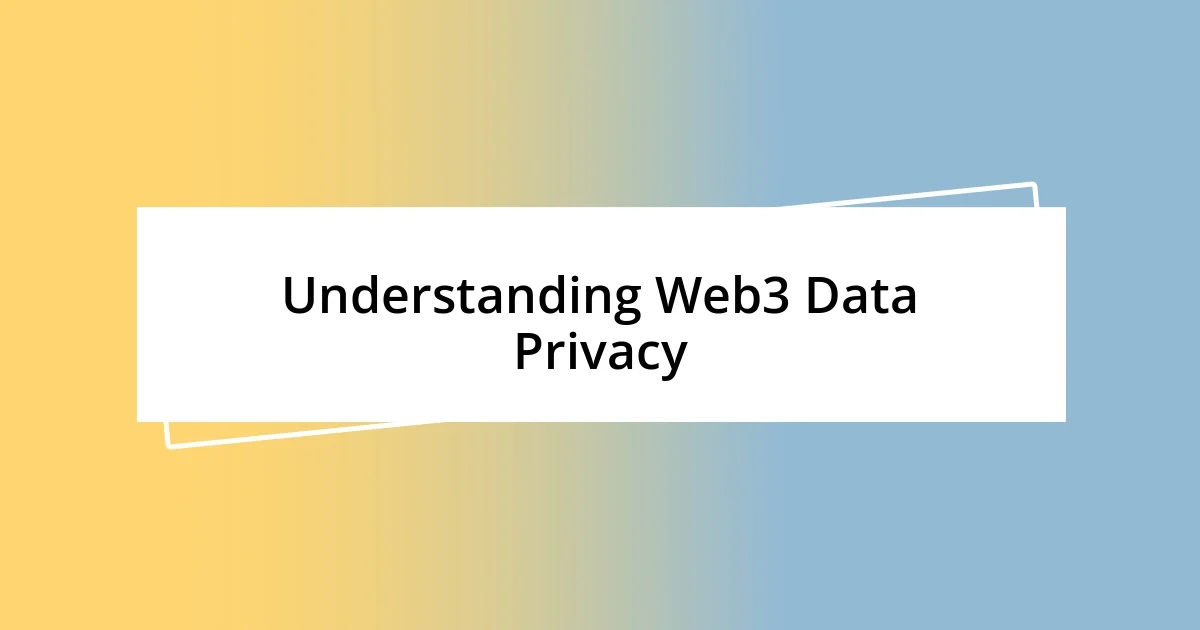
Understanding Web3 Data Privacy
Navigating Web3 data privacy feels like stepping into uncharted territory. I remember the first time I engaged with decentralized applications; I was thrilled yet anxious about how my personal data was handled. It makes you wonder: Are we truly in control, or are we simply trading one form of data vulnerability for another?
In my experience, privacy in Web3 extends beyond just having a wallet address instead of a name. It’s about understanding the intricate dance between anonymity and transparency. When I transferred my first NFT, the thrill was palpable, but so was the realization that every interaction was recorded on a public ledger. What does it mean to be ‘private’ when so much is visible to anyone who knows where to look?
As I delve deeper into this landscape, I often ponder the tools available for protecting our privacy. The myriad options for encrypting data can feel overwhelming, but I’ve learned that education is empowerment. Each encryption method reminds me of a layer of armor in a digital realm riddled with potential pitfalls—what steps are you taking to shield your identity amidst the excitement of Web3?
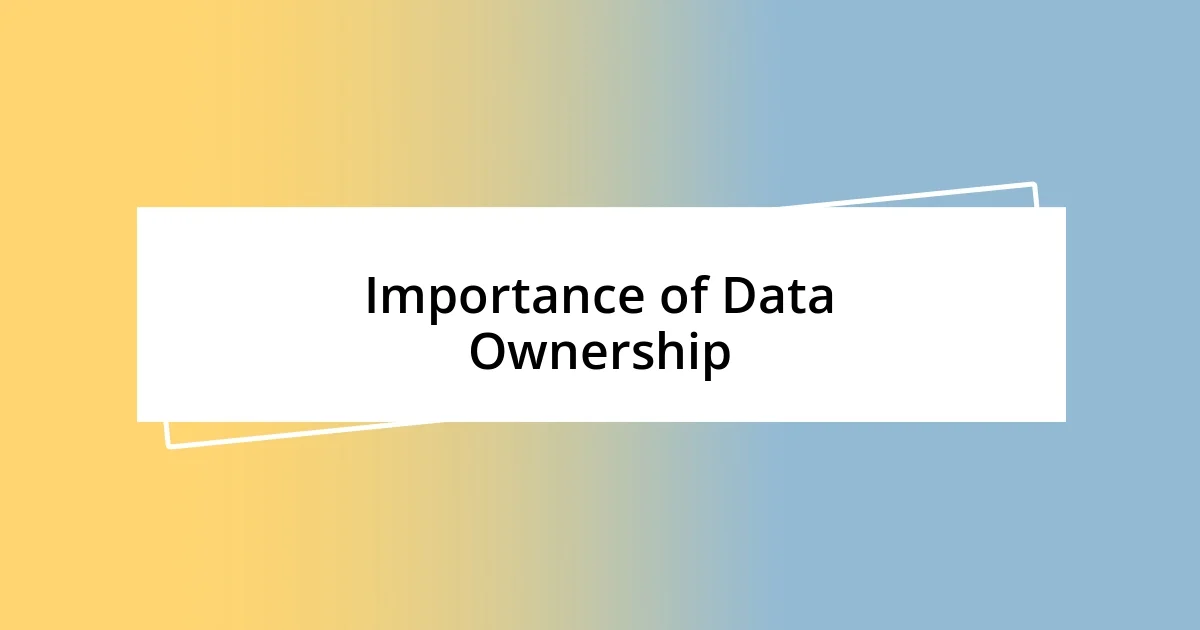
Importance of Data Ownership
Data ownership is increasingly vital in our digital age, particularly within the Web3 ecosystem. I remember a time when I shared personal information with various platforms without thinking twice. Now, I realize that having control over my data means safeguarding my identity and my digital footprint. When I dive into new decentralized platforms, I seek clarity on how my data is used and monetized, ensuring that I’m not just another cog in someone else’s machine.
The shift to data ownership empowers individuals like you and me. Just a few months ago, while exploring a decentralized social network, I felt a sense of liberation from the traditional data-sharing agreements. Instead of relinquishing my data to corporations, I found myself in a space where I could choose what to share and with whom. This newfound sovereignty offers the chance to build genuine connections while preserving my personal information.
Moreover, data ownership underpins the entire ethos of Web3. It creates a wealth of opportunities for individuals to monetize their data directly. I recall setting up my first smart contract, and it was exhilarating to realize I could specify how my data could be utilized by others. Each decision felt like taking back agency in a world increasingly reliant on personal information—a revolution worth embracing.
| Aspect | Description |
|---|---|
| Empowerment | Giving individuals control over their data fosters autonomy and choice. |
| Transparency | Data ownership leads to clearer understanding and usage rights of personal information. |
| Monetization | Individuals can profit from their data instead of corporations profiting without consent. |
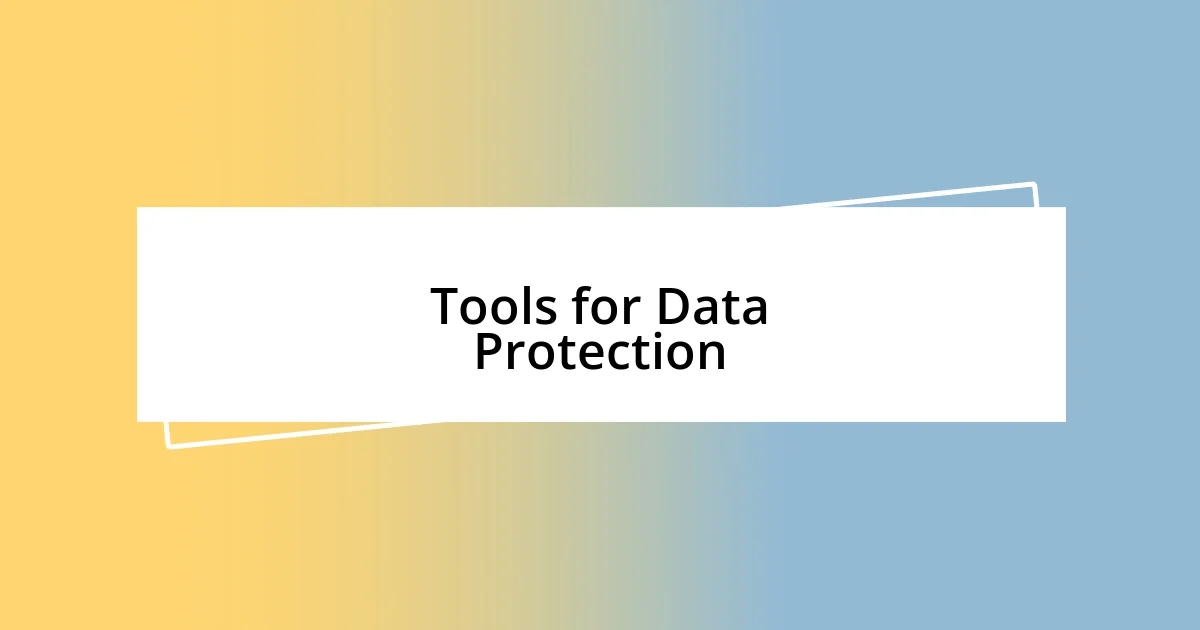
Tools for Data Protection
When it comes to protecting our data in the Web3 space, choosing the right tools can feel like assembling a digital toolbox. I remember grappling with all the options available, from VPNs to encryption software, and it was genuinely daunting. However, I’ve found that a curated selection of tools not only helps to safeguard my privacy but also provides peace of mind when navigating this expansive landscape.
Here’s a list of some critical tools I rely on for data protection in Web3:
- VPN (Virtual Private Network): Hides my IP address and encrypts internet traffic, making it essential for secure browsing.
- Encrypted Wallets: Platforms like MetaMask and Ledger offer additional layers of protection for my cryptocurrencies and digital assets.
- Decentralized Identity Solutions: Tools like uPort allow me to manage and share my identity selectively, reducing the risk of data breaches.
- Privacy-oriented Browsers: Browsers like Brave prioritize user privacy, blocking trackers and providing a faster, cleaner browsing experience.
- Secure Messaging Apps: Platforms such as Signal and Wickr ensure my communications remain private and encrypted.
Each of these tools has played a role in my journey to feeling more secure online. I recall one incident where I nearly fell for a phishing attempt while interacting with a DeFi platform. Thankfully, my VPN alerted me to the unsafe connection, prompting me to rethink my approach. That moment underscored the importance of integrating protective tools into my daily Web3 activities—an ongoing endeavor I believe we all should embrace.
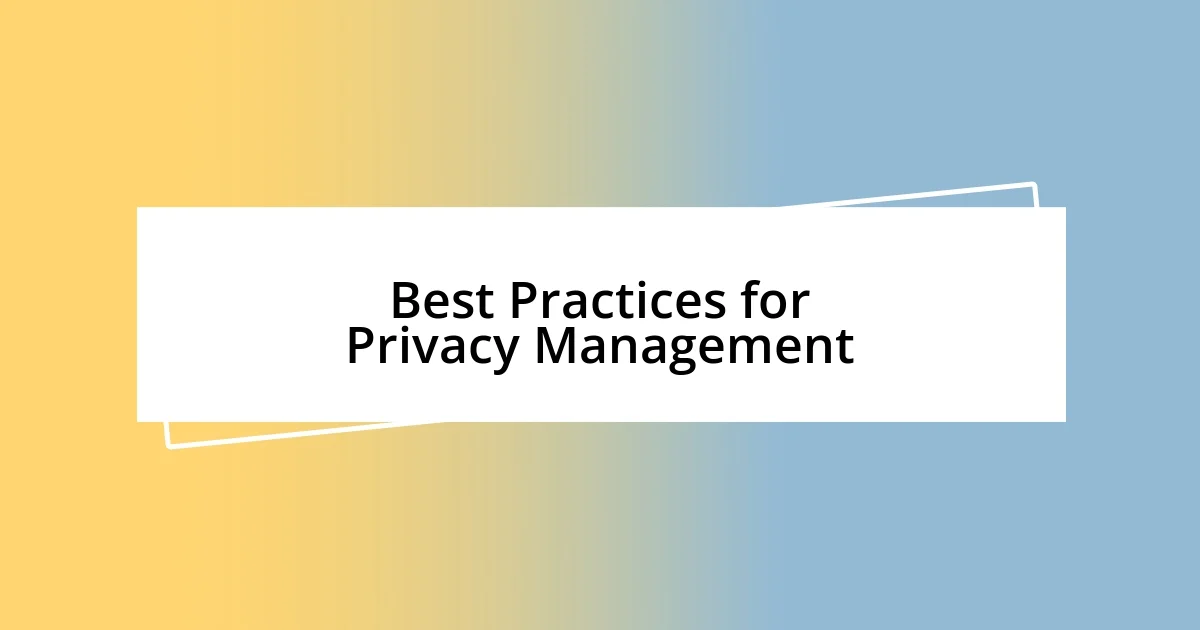
Best Practices for Privacy Management
Managing privacy in the Web3 environment requires a proactive approach. One of the best practices I’ve learned is to regularly review and adjust privacy settings on the platforms I engage with. Every time I sign up for a new decentralized service, I pause to examine what data I’m sharing and whether it aligns with my comfort level. It never fails to amaze me how many users overlook this simple yet essential step.
In my experience, being selective about the platforms I trust has been a game-changer. I recall trying out a popular new DApp and immediately noticing its vague privacy policy on data usage. After digging a little deeper, I found concerns from other users about data mishandling. That experience pushed me to adopt a rule: if I sense a lack of transparency, I vote with my feet. After all, if a platform isn’t clear about its practices, can I really trust it with my information?
Lastly, embracing a culture of continuous learning around privacy issues is crucial. I try to educate myself about the latest trends, tools, and threats in the Web3 space. Just a few weeks ago, I stumbled across an enlightening webinar on blockchain-based privacy features, and it opened my eyes to innovative solutions I hadn’t considered. How often do we seek out knowledge that can empower us? By staying informed, I feel more equipped to navigate this complex landscape while keeping my data safe and sound.
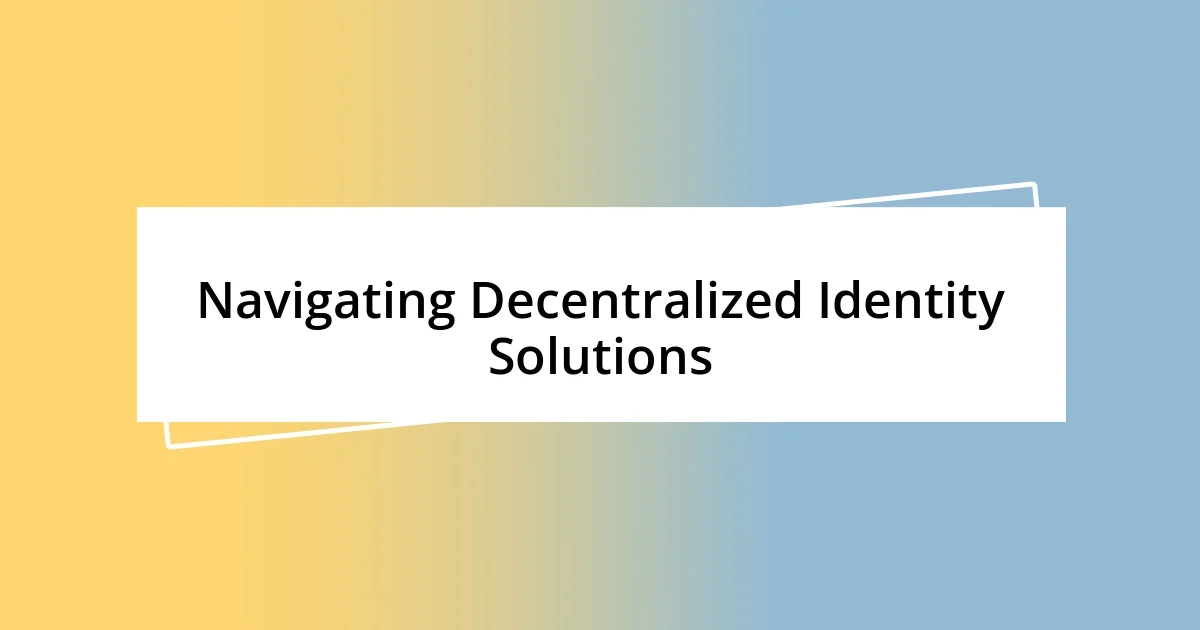
Navigating Decentralized Identity Solutions
When diving into decentralized identity solutions, I was initially overwhelmed by the variety of platforms. But using tools like Self-sovereign identity (SSI) made a significant difference for me. I remember setting up my uPort profile for the first time; it felt liberating to control who could see my information. Isn’t it comforting to think that our identities don’t have to be scattered across countless databases? With these solutions, I can present my identity seamlessly while maintaining a level of privacy that feels just right.
What I appreciate most about decentralized identity solutions is their focus on user empowerment. In one instance, I was applying for a decentralized finance service and was blown away by how easily I could verify my identity without exposing extraneous personal details. Rather than handing over everything on a silver platter, I selectively shared only what was necessary. This experience reinforced the realization that we should be the gatekeepers of our identities. How often have we blindly filled out forms, giving away too much? By navigating these solutions mindfully, we can reclaim our data.
Additionally, the interactivity of decentralized identity offers a unique layer of protection against identity theft. I can’t help but feel a sense of security knowing that even if one platform faces a breach, my identity isn’t fully compromised. It struck me during a workshop I attended when someone mentioned that decentralized identities could be like ‘digital shields’—a metaphor that resonated deeply with me. Isn’t it incredible to think we can face the digital world equipped with such armor? Embracing these solutions has not only enhanced my privacy but also fostered a deeper connection with my digital self.
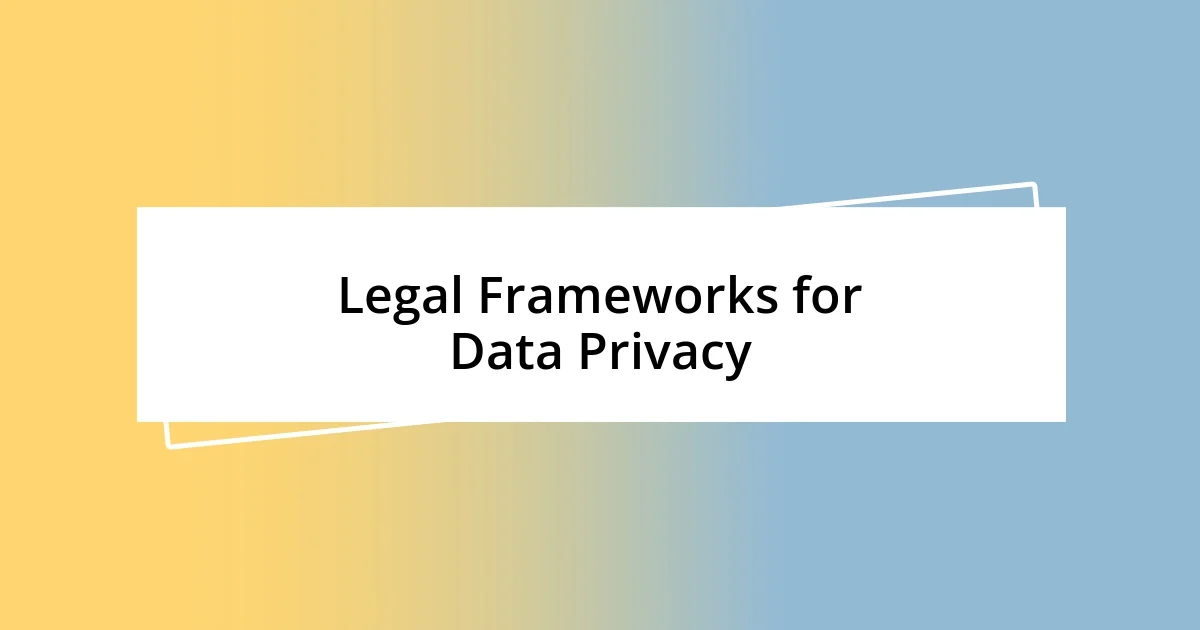
Legal Frameworks for Data Privacy
Legal frameworks for data privacy in the Web3 space are evolving, and I find myself constantly seeking to understand their nuances. For instance, I often refer to regulations like the General Data Protection Regulation (GDPR), which has set a high standard for privacy practices globally. Navigating these rules can feel daunting, especially when different jurisdictions adopt varying approaches. Ever had that moment when you’re unsure if your favorite platform complies with these laws? It’s a valid concern, and it highlights the need for transparency in how platforms operate.
One framework that caught my attention is the California Consumer Privacy Act (CCPA), which offers consumers more control over their personal data. The first time I read about the CCPA, I felt a wave of relief knowing that as a consumer, I had rights — like the ability to request what data is collected about me. It made me reevaluate how I approached online services. I remember submitting a CCPA request to a popular service, and the process, albeit complex at first, empowered me to understand exactly what data they held. How many of us feel we possess that level of agency?
Another intriguing aspect of legal frameworks is their interplay with blockchain technology. This technology challenges traditional privacy laws by introducing concepts of immutability and transparency. I had an eye-opening discussion with a friend about how smart contracts could redefine consent in the data-sharing process. Imagine a world where you could sign a contract that automates data sharing only with explicit, documented consent. Isn’t that the kind of revolutionary change we’ve been craving? It’s exciting to consider how evolving legal standards can pressure platforms to respect user privacy more thoroughly.
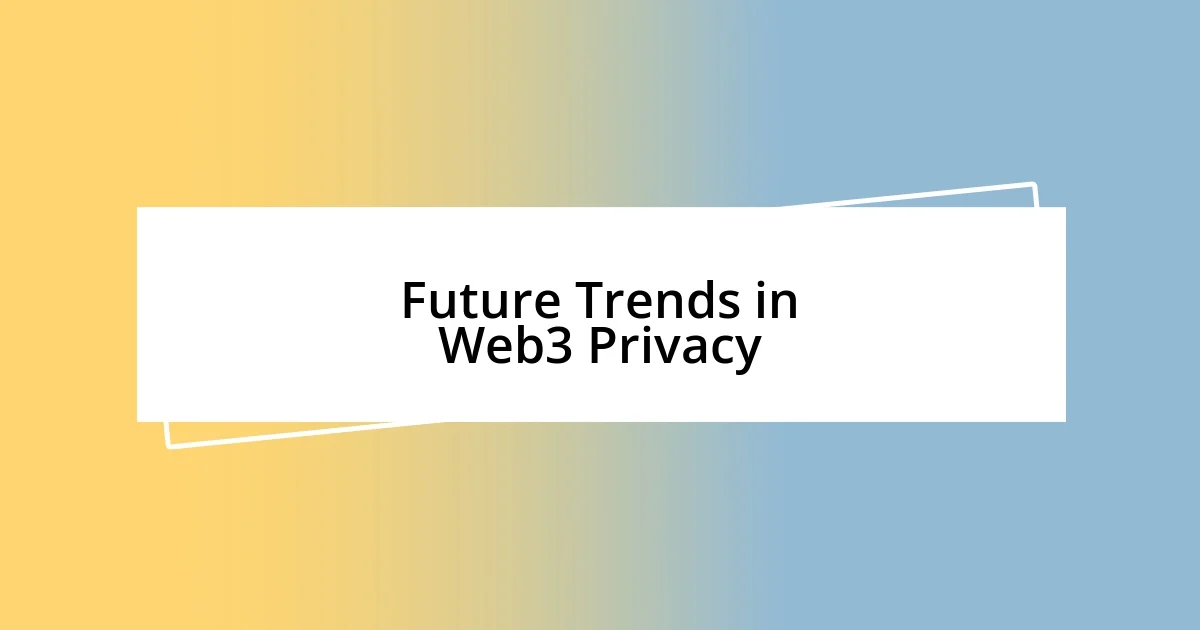
Future Trends in Web3 Privacy
As I look ahead to the future of Web3 privacy, one trend that stands out to me is the development of privacy-preserving technologies like zero-knowledge proofs (ZKPs). I vividly recall the moment I first understood how ZKPs could allow transactions to be validated without revealing the underlying data. It was like a eureka moment! Think about it—being able to prove something is true without disclosing details. Isn’t that an exciting shift towards achieving privacy by design?
Moreover, I’ve noticed a growing emphasis on privacy by default in new applications. Recently, I experimented with a decentralized messaging platform that automatically encrypted my conversations. It made me realize how often we take privacy for granted in traditional apps. I can’t help but wonder why it’s taken us so long to prioritize security in our communications. Wouldn’t it be refreshing if all platforms adopted such a mindset, empowering users instead of burdening them with complex privacy settings?
Lastly, I see a rise in community-driven governance models that allow users to participate in shaping data-use policies. For instance, during a recent online forum, I was struck by the passionate discussions on community ownership of data. It was empowering to think that as users, we could collectively decide how our data is handled. Isn’t it fascinating how decentralization not only enhances privacy but also fosters a sense of belonging and accountability among users? This trend could potentially set a new precedent for how we engage with and think about our digital identities in the future.












